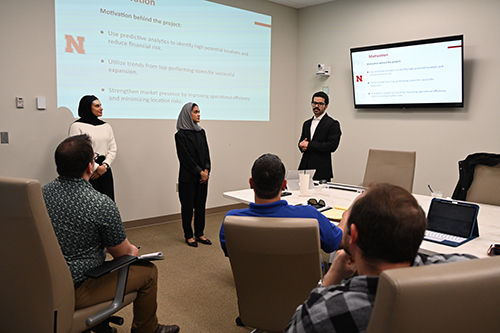Before crossing the stage at graduation, supply chain management majors at the University of Nebraska–Lincoln test their knowledge in Strategic Supply Chain Management (SCMA 474), the program’s capstone course. Tasked with solving real business challenges, students dive into data, collaborate in teams and present their findings directly to company leaders.
 (Left to right) Wiam Ambusaidi, Asila Al Rawahi and Saleh Al-Subeihi presented their predictive analytics model to Boss Truck Shops representatives at Hawks Hall.
(Left to right) Wiam Ambusaidi, Asila Al Rawahi and Saleh Al-Subeihi presented their predictive analytics model to Boss Truck Shops representatives at Hawks Hall.
This spring, one team partnered with Boss Truck Shops, a Grand Island, Nebraska-based company with 44 locations across 24 states, to help inform site selection for a new truck stop location. Using predictive analytics, regression modeling and industry data, the students created a tool that helps Boss Truck Shops assess potential locations and forecast their performance.
“Our goal was to give Boss Truck Shops a data-driven way to reduce the financial risk of expansion and prioritize high-performing areas,” said Wiam Ambusaidi, a graduating senior from Muscat, Oman. “We used R to build multiple models, identified the strongest predictors of sales and tested our models using actual fuel station locations we found through Google Maps.”
The students’ work built upon a previous year’s project with Boss Truck Shops. With access to a broader dataset this year, they strengthened the accuracy of the predictive model by including more variables such as the number of service bays, proximity to interstates, fuel brand partnerships, parking availability and nearby competition.
“The team demonstrated impressive growth throughout the project,” said Esma Gel, Cynthia Hardin Milligan Chair of Business and professor of supply chain management and analytics. “They expanded their technical skills, identified significant sales drivers and built regression models with strong predictive power. Their ability to communicate their findings clearly and confidently was just as impressive as their analytical work.”
For the students, the semester-long collaboration provided hands-on experience in solving supply chain challenges with real-world data. The team members shared how they developed new coding techniques to address the project's needs.
“It was tough at the beginning, but we’re proud of what we accomplished,” said Saleh Al-Subeihi. “This project gave us something tangible we can use in our portfolios and resumes.”
Boss Truck Shops, now in its third year of working with students in the capstone course, continues to find value in the student partnership.
“We really wanted an outside perspective—something unbiased that could help us challenge our current thinking,” said Logan Belville, manager of business development. “You go in expecting one answer, and students come back with a better one. It’s energizing to see their ideas come together and help us make more confident decisions.”
Collaborating with the employer provided students with access to real data and practical business challenges. It also gave them a chance to make a meaningful difference.
“It’s always impressive to see students take on a real challenge and build something useful from scratch," said Justin Johnson, category manager for Boss Truck Shops. "Their ability to adapt, ask smart questions and turn data into actionable insights has made this a valuable partnership for us.”
The students also gain more than just a final grade. They move forward into their careers with using data to drive strategy, confidence to present to industry leaders and pride of collaborating in the classroom to find real business solutions.
“We look for projects that push our seniors to apply the tools and methods they’ve learned, from forecasting demand to optimizing logistics,” Gel said. “Boss Truck Shops has been an ideal partner, and this team really showed how well students can deliver when given the opportunity.”
The College of Business offers many ways to partner in class projects, so business professionals interested should complete this form.
Published: June 19, 2025